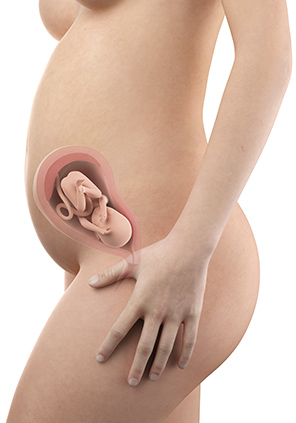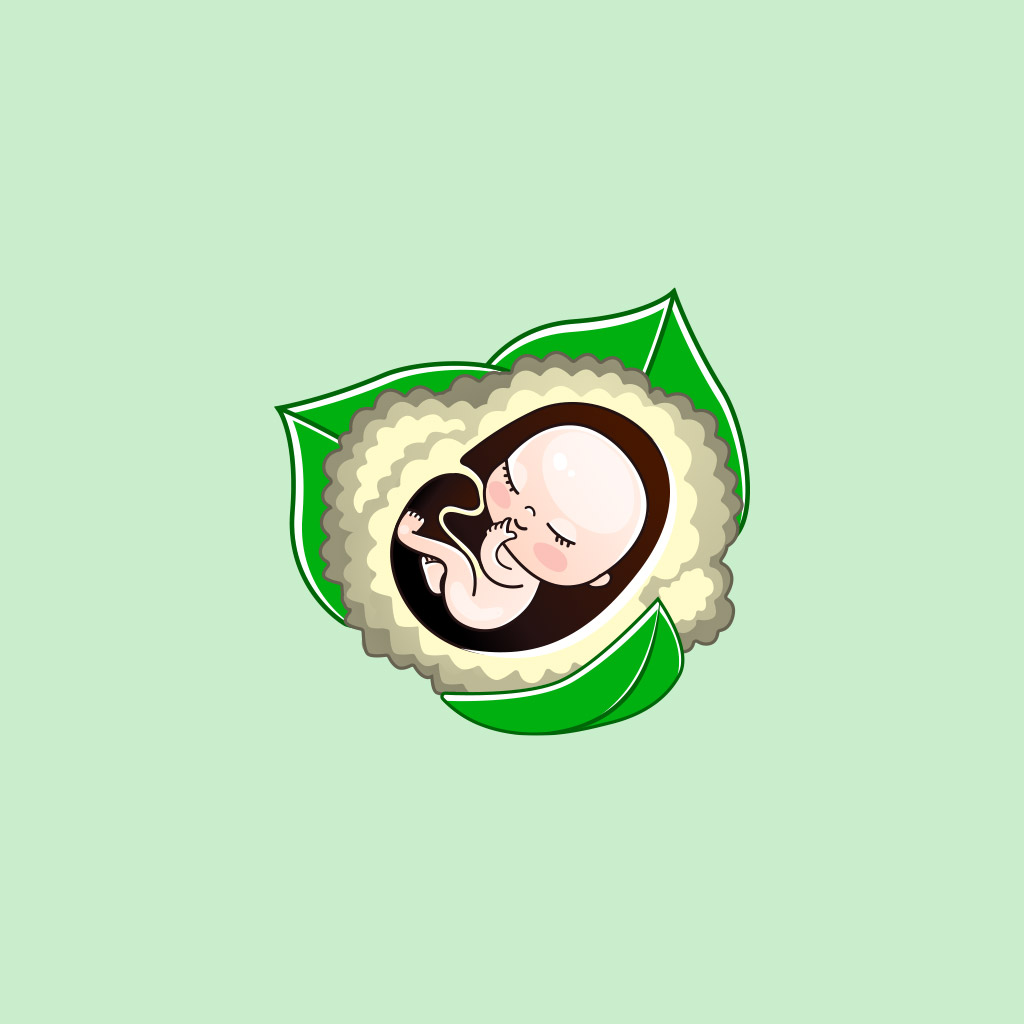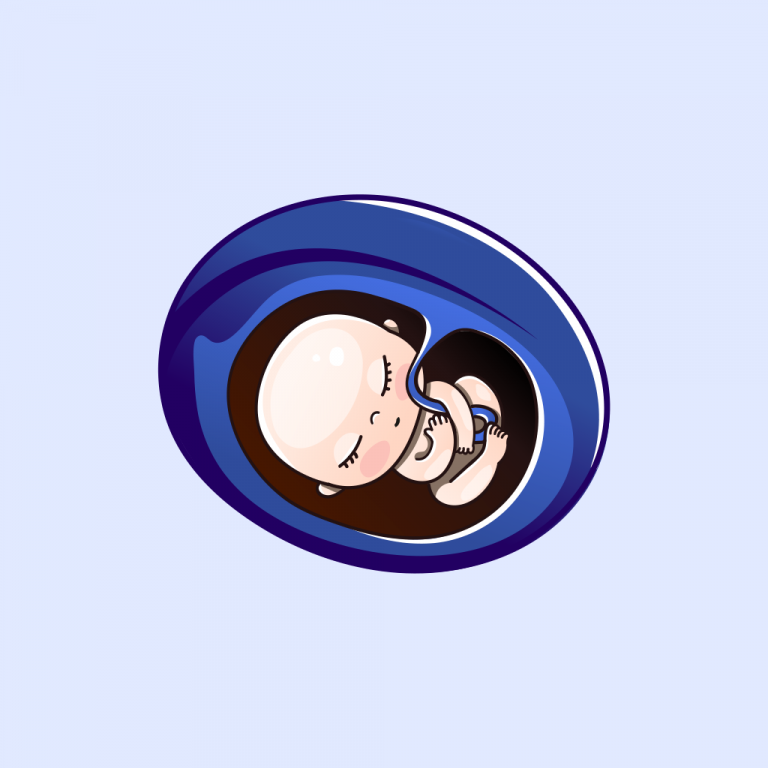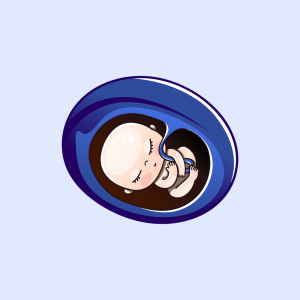Welcome to week 22 of your pregnancy! At this point, you’re just past the halfway mark, and both you and your baby are making remarkable progress. You may notice a deeper sense of connection with your little one as both of you continue to grow and change each week.
By now, your baby is about the size of a papaya—measuring close to 11 inches from head to heel and weighing almost a pound. This is a busy period for your baby’s senses. Their eyes are developing, and their lips and eyelids become more distinct. Although their eyelids are still closed, your baby is starting to sense light and dark from inside the womb. Tiny taste buds are forming, allowing them to experience different flavors through the amniotic fluid when you eat!
Many moms begin to feel stronger movements this week. These first real “kicks” or gentle flutters are special moments and a wonderful reminder that your baby is active and healthy. If you haven’t noticed much movement yet, try sitting quietly after a meal—sometimes, babies tend to be more active then. Remember, every pregnancy is unique, and it’s perfectly normal for these sensations to start a little later for some moms.

Your body continues to adjust to support your growing baby. You might notice your belly rounding out more, and some women experience mild swelling in their hands, feet, or ankles. Easy walks, supportive footwear, and keeping your feet up when you can all help you feel more comfortable. If swelling becomes sudden or severe, always check with your healthcare provider, as they are there to support you with any concerns.
Some moms notice stretch marks or changes in skin pigmentation around week 22. Moisturizing daily can help your skin feel less itchy and tight. And don’t forget, hydration matters now more than ever—aim for plenty of water throughout your day.
This stage brings its ups and downs, and it’s normal to feel a mix of emotions. Make time to rest, celebrate your progress, and reach out if you need extra comfort or guidance. Every week brings new milestones—enjoy these changes as you and your baby grow stronger together.
Your Baby’s Development This Week
At 22 weeks pregnant, your baby has come a long way and is growing stronger every single day. Around this time, your little one is about the size of a papaya—measuring nearly 11 inches from head to heel and weighing almost a pound. That means if you held a medium coconut in your hands, it would be about the same size as your baby right now!
One of the most exciting developments this week is how much more your baby looks like a newborn. Fine, soft hair called lanugo now covers your baby’s body, helping to keep them warm. Eyebrows are more defined, and the first wispy hairs might be appearing on the scalp—even though they might not be the same color as the hair your baby will have after birth.
Your baby’s face is becoming more expressive, even though their eyelids are still closed and fused shut for now. Amazingly, their eyes can move behind the lids, and the muscles that control eye movement are getting stronger. Though it’s too soon for your baby to open their eyes, the eyes themselves are fully formed and will soon start to react to changes in light coming through your belly.
This week brings exciting advances in your baby’s senses. Their hearing is improving, and they can start to notice loud noises, like a dog barking or a vacuum cleaner running. If you or dad talk or sing to your bump, your baby might actually recognize these voices later and find them soothing. There’s even evidence that babies respond to music and sounds they hear regularly in the womb—so don’t hesitate to share your favorite songs.
Touch is becoming an important sense, too. Your baby can now touch their own face, ears, and even wrap tiny fingers around the umbilical cord. These new exploratory movements help build connections in the developing brain and muscles.
Inside, important organs are hard at work, practicing for life after birth. Your baby’s lungs are growing and starting to make something called surfactant, a substance that will help them breathe air once they arrive. For boys, this week marks the beginning of testicular descent, while in all babies, the tear ducts are starting to form, getting ready for those first tears after birth.
- Fun fact: Your baby’s heart has grown to a size with a strong heartbeat so that it can be heard with a regular stethoscope. It requires skill and patience to find the baby’s heartbeat in this way. Their heart beats about twice as fast as yours!
- If you’ve had an ultrasound lately, you might have seen your baby practicing swallowing or sucking, skills they’ll soon need for feeding.
- As your baby gets more active, you might notice gentle flutters or stronger kicks—each movement is a sign that those muscles are developing well.
Each day, your baby is growing and practicing for their big debut into the world. Take comfort in knowing that the little one inside you is making incredible strides—and that every giggle, hum, or story you share is already making a difference. Keep watching for those tiny kicks and enjoy this special time of connection!
Changes in the Mother’s Body
At 22 weeks pregnant, you might feel like your pregnancy is becoming more real with each passing day. Your baby is busy growing, and your body is changing right along with them. Let’s walk through some of the common things you might notice this week, and what they mean for you and your little one.
Your Growing Belly
By now, your baby bump is likely noticeable, and you may find yourself reaching for more comfortable clothing. Your uterus sits just above your belly button and will continue rising as your baby grows. Some moms notice their belly button starting to pop out—a fun (and sometimes funny) milestone!
Feeling More Movement
This is often the time when many women start to feel stronger baby kicks, wiggles, or even rolls. These gentle flutters are a reminder that your baby is active and growing. If you’re not feeling much yet, don’t worry—all pregnancies are unique, and some babies are just a little more subtle with their movements at this stage.
Physical Symptoms You Might Notice
- Swelling in Feet and Ankles: As your body holds onto more fluid, you might spot puffiness in your feet or ankles, especially after standing for long periods. Elevating your legs when you can and wearing comfortable shoes can help.
- Loosening Joints: Pregnancy hormones help relax your ligaments to prepare your body for birth. This means you might feel a bit more wobbly or notice your shoes feel snug, not just from swelling but because your feet may actually widen slightly.
- Backaches: The extra weight in your belly can change your posture, which often leads to mild back discomfort. Gentle stretches, supportive shoes, and a heat pack can offer relief.
- Breathlessness: As your uterus grows, it presses up against your diaphragm. You might find yourself getting winded more easily, even doing everyday activities. Try to move at a comfortable pace and take rest breaks as needed.
- Skin Changes: Stretch marks can appear almost overnight as your belly grows. While there’s no proven way to prevent them, keeping your skin moisturized can help with itchiness. Some women also notice darker patches of skin on their face or belly—this is normal and usually fades after birth.
- Warmth and Flushing: Increased blood flow during pregnancy can make you feel warmer than usual. Dress in layers you can remove easily and keep cool with water or a gentle fan if needed.
Emotional Wellbeing
Many women find the second trimester a time of increased energy and mood, but emotional ups and downs are still normal. Don’t hesitate to share how you’re feeling—physically and emotionally—at your next checkup. Your healthcare team is there to support you every step of the way.
Remember, every pregnancy journey is unique. Some days you might feel great, and other days you might feel tired or achy. Be gentle with yourself, listen to your body’s signals, and don’t hesitate to reach out to your healthcare provider with any concerns or questions. You’re doing an amazing job nurturing your growing baby!
What Medical Checkups Happen at Week 22?
At 22 weeks, your pregnancy is moving right along, and it’s time to check in on both your health and your baby’s growth. These routine appointments are just as important as ever—and they’re a chance for you to ask questions, get reassurance, and make sure you’re on track for a healthy pregnancy.
- Measuring Your Baby’s Growth: Your doctor or midwife will likely measure your belly to see how much your uterus has grown. This helps them check that your baby is growing at a healthy pace. The distance between your pelvic bone and the top of your uterus (called fundal height) is one clue.
- Vital Signs and Monitoring: Each visit, your blood pressure and weight will be checked. Tracking these helps your healthcare provider spot any early signs of pregnancy complications such as preeclampsia (high blood pressure in pregnancy) or problems with weight gain, so they can step in early if needed.
- Checking for Swelling and Discomforts: Your pregnancy care team will ask about any new symptoms you’ve noticed. A bit of swelling in your feet is common at this stage, but sudden or severe swelling is something to report right away, as it could need closer attention.
- Listening to Baby’s Heartbeat: One of the most reassuring parts of your visit: listening to your baby’s heartbeat! Your provider will use a special device (called a Doppler) so you can hear those precious heartbeats together.
- Questions About Movements: You may start noticing your baby moving more, but movement varies from person to person. Your provider will talk with you about what to expect, and when you might feel those little kicks and rolls.
- Anatomy Ultrasound (if not yet done): Week 22 is a common time for an in-depth ultrasound, sometimes called the “anatomy scan.” This detailed look checks your baby from head to toe—measuring organs, counting fingers and toes, and making sure everything looks right for their stage of development. Many parents look forward to this scan—it’s a chance to see your baby’s features, and sometimes even find out the sex of your baby if you wish to know.
- Finishing Up Some Screenings: If you chose to have genetic tests earlier in pregnancy (like amniocentesis or blood screens), most of these are finished by this stage. Your healthcare provider will let you know if any follow-up is needed.
- Getting Ready for What’s Next: Your doctor or midwife might start talking about future tests, like the glucose screening for gestational diabetes, which often happens around 24-28 weeks. This way, you’ll know what to expect at your next visit.
Remember, every checkup is important—even if you’re feeling great! And if you ever notice things like severe pain, heavy bleeding, vision changes, or you suddenly feel much less movement from your baby, call your pregnancy care center right away. Checking in early helps keep both you and your growing baby healthy and safe.
Nutritional Tips and Physical Exercise
At 22 weeks, your baby is growing quickly, and your body is working hard to keep up. Every nutritious choice and gentle movement you make helps nourish both you and your little one. Here are some friendly, practical tips to keep you feeling your best this week:
- Try New Healthy Foods: If leafy greens like spinach or kale aren’t your favorite, try adding them into smoothies, omelets, or soups for a nutrition boost you might not even notice. Exploring different fruits—like berries or mangoes—can also add variety and important vitamins to your meals.
- Boost Your Fiber: Many women experience constipation around this time. Eating more whole grains (like oatmeal, brown rice, or quinoa), beans, and crunchy veggies can help keep things moving smoothly and make you feel more comfortable.
- Iron-Rich Snacks: Your blood volume is still increasing, so snacks like a handful of dried apricots, a small bowl of fortified cereal, or hard-boiled eggs can help you meet your iron needs. Pairing iron-rich foods with vitamin C—like orange slices or bell peppers—helps your body absorb more of this important nutrient.
- Stay Well Hydrated: Aim to drink water throughout the day, not just when you’re thirsty. Many moms find it helpful to carry a refillable bottle as a reminder. Adding a splash of lemon, berries, or cucumber can make water more enjoyable.
- Small, Frequent Meals: As your uterus grows, your stomach may feel fuller faster or you may get heartburn. Eating smaller portions more often can make digestion easier and help manage these common discomforts.
- Smart Calcium Choices: Besides dairy, calcium can be found in foods like almonds, broccoli, fortified orange juice, and tofu. These foods support your baby’s bones while keeping your meals interesting.
- Keep Caffeine in Check: You might crave a little extra energy, but too much caffeine isn’t recommended. Herbal teas (make sure they’re pregnancy-safe), decaf coffee, or warm milk can be cozy replacements.
Gentle, regular movement is just as essential as good nutrition for your comfort and health.
- Walking: A daily walk—even just 20 to 30 minutes—can boost your energy, help circulation, and ease backaches. Try walking in the morning or evening if midday heat makes you uncomfortable.
- Stretching and Prenatal Yoga: Slow, gentle stretching or a beginner’s prenatal yoga class can relieve muscle tension and support your changing body. Focus on moves that open your hips, ease back stiffness, and encourage deep breathing.
- Pelvic Floor Exercises: Also known as Kegels, these strengthen muscles that support your uterus, bladder, and bowels. Practicing daily now may help with labor, delivery, and recovery afterward.
- Listen to Your Body: Any safe activity should leave you feeling good, not gasping or dizzy. If you notice pain, lightheadedness, or anything unusual, pause and check in with your care provider.
- Make It Fun: Dancing to your favorite music, gentle swimming, or even gardening can be a joyful way to keep moving. Let your comfort, energy, and mood guide you.
Every mom and every pregnancy is a little different. These habits may take some experimenting to fit your routine, and that’s okay. Prioritize self-care, rest when you need to, and reach out to your healthcare provider if you have questions about nutrition or exercise. You’re doing a wonderful job taking care of yourself and your growing baby!
Weekly Checklist
As you reach Week 22, it’s natural to have new questions and notice more changes in your body and daily routines. Here are your helpful to-dos for this week, designed to support both your health and your baby’s growth:
- Keep a gentle movement diary. Start paying closer attention to your baby’s kicks, flutters, and wiggles. While you might not feel a pattern yet, jotting down when you notice movement can help you understand your baby’s rhythms and prepare for later weeks when tracking movement is more important.
- Choose supportive shoes. If you’re experiencing swelling or your feet feel bigger, consider wearing shoes with good arch support and some extra room. This can make daily activities much more comfortable as your body adjusts to pregnancy changes.
- Practice gentle back care. As your bump grows, mild backaches can be common. Try stretching gently, sitting with good support, or even using a small pillow behind your lower back. Schedule time for relaxation—your muscles will thank you.
- Moisturize your skin regularly. With stretch marks appearing for some, keeping your skin hydrated with lotion or oil can ease itching and help you feel more comfortable, especially over your belly, breasts, and hips.
- Stay ahead of heartburn. If you notice more heartburn, try eating smaller, more frequent meals and avoid lying down right after eating. Keep a bottle of water nearby, and talk to your healthcare provider if it gets uncomfortable.
- Review your nutrition. Double-check that your meals include good sources of iron—like spinach, lean meats, or fortified cereals—since your blood volume is rising. It’s also a good time to try adding leafy greens and yogurt for added calcium and vitamin D.
- Track any swelling or unusual symptoms. Check your hands, feet, or face for any sudden or excessive swelling. While mild swelling is normal, let your provider know right away if it becomes severe or is paired with headaches or vision changes.
- Connect with your care provider. Prepare a list of any new symptoms or questions before your next appointment. Feel comfortable asking about what to expect with fetal movement, managing discomforts, or anything else on your mind.
- Plan a relaxing activity just for you. Take time this week to unwind—whether it’s reading, listening to music, or taking a warm (not hot) bath. Your wellbeing matters just as much as baby’s, and rest helps both of you.
- Continue prenatal vitamins and hydration. Stick with your daily prenatal vitamins and drink plenty of water throughout the day. This will help keep your energy up and support your baby’s ongoing development.
Every week brings new changes. Celebrate your progress, and always reach out to your healthcare team with questions—they’re there to support you on this journey!
When to Call Your Provider
Your well-being—and your baby’s—is always important, so it’s natural to wonder what’s normal and what might need a check-in with your healthcare team. While many symptoms are simply part of pregnancy, there are certain warning signs that should never be ignored. If you’re unsure, it’s always better to reach out. Here are the main reasons to call your doctor or midwife during your 22nd week:
- Heavy Bleeding or Passing Clots: Any bleeding or clotting, even if it stops on its own, should be checked as soon as possible.
- Sudden or Severe Abdominal Pain: If you experience strong, persistent pain or cramping in your belly that doesn’t fade or gets worse, give your provider a call right away.
- Severe Headaches or Vision Changes: Intense, unrelenting headaches, seeing spots, blurred vision, or sudden sensitivity to light could mean your body needs extra attention.
- Rapid Swelling: Swelling in your face, hands, or around your eyes—especially when it happens suddenly—can be a sign of something more serious than the mild swelling in feet and ankles that’s common in pregnancy.
- High Fever: A fever over 100.4°F (38°C) that doesn’t go away with regular medicine, or is accompanied by chills or body aches, is worth discussing with your doctor.
- Leaking Fluid: If you notice a constant trickle or sudden gush of clear, watery fluid from your vagina, contact your provider, as this might mean your water has broken early.
- Signs of Infection: Burning sensation while peeing, foul-smelling discharge, or unusual itching or irritation may point to a urinary tract or other infection that needs prompt treatment.
- Decreased Fetal Movement: While baby’s movements may be light or sporadic at this stage, you should notice some wiggles each day. If you suddenly feel much less or no movement, let your healthcare provider know.
- Persistent Vomiting: Throwing up several times a day, or being unable to keep fluids down, can quickly lead to dehydration—don’t wait to reach out.
- Difficulty Breathing or Chest Pain: Any trouble catching your breath that’s new or accompanied by chest pain deserves immediate medical attention.
- Sudden Feeling of Faintness or Dizziness: Lightheadedness that won’t pass, especially if paired with palpitations or confusion, should be reported.
- Signs of Deep Sadness or Anxiety: If you’re finding it hard to get through the day, feel overwhelmed by worry or hopelessness, or you’re just not feeling yourself emotionally, please share this with your provider. Your mental health matters.
Always trust your instincts. If something feels off or you just have a nagging worry—even if it isn’t on this list—don’t hesitate to call your care team. They are there to help, support, and guide you every step of the way.
Preparations for Baby
Week 22 is a wonderful time to start making your space—and your mind—ready for your little one. As your belly grows, you may find your thoughts turning to all the ways you can help your baby feel safe and loved as soon as they arrive. Here are some simple steps to help you feel prepared and positive about the journey ahead:
- Organize Baby’s Basics: If you haven’t already, consider picking out a spot for diapering supplies, soft blankets, and a safe sleep area. Even if the nursery isn’t ready, having a small basket with essentials nearby can be so helpful in those first few weeks.
- Budget and Plan for Must-Haves: Start jotting down a list of things you’ll need soon (like newborn clothes, a car seat, and feeding supplies). Don’t worry about getting everything at once—just focus on the basics to begin with.
- Picture Your Support Team: Think about friends or family you might want nearby when baby arrives, whether for quick check-ins, meal deliveries, or moral support. It’s perfectly okay to ask for help and talk openly about what you might need.
- Communicate with the Dad: This is a great time to chat about hopes, worries, and practical plans for the baby’s arrival. Share your thoughts on baby names, sleeping arrangements, or visitors after birth. Honest conversations can ease your mind and keep you connected.
- Create a Calming Corner: Take a moment for yourself and set aside a spot where you can relax, read, or just breathe. Cozy up with a favorite book or calming music—caring for your own well-being is a loving way to care for your baby, too.
- Start Nutrition Habits for Baby: Try new, nourishing recipes and practice eating regular meals. Involving your partner in meal prep or exploring easy freezer-friendly dishes can help you feel ready for busy days ahead.
- Enjoy the Connection: If you’re starting to feel gentle flutters, pause every so often to talk, sing, or read to your baby. These tiny moments can help you bond and might even soothe baby after birth!
- Document the Journey: Take a belly photo or jot down a few thoughts in a journal. Looking back on these memories can be heartwarming for you and fun to share with your baby someday.
Remember, there’s no “perfect” way to prepare—all that matters is that you and your family feel as ready and supported as possible. Be kind to yourself, lean on loved ones, and know that every step you take counts in welcoming your little one home.
Citations and References
- American College of Obstetricians and Gynecologists (ACOG) – Offers guidance on fetal development, prenatal visits, nutrition, and symptom reporting during the second trimester. Visit Source
- Mayo Clinic – Details week-by-week fetal growth (size, senses, anatomy scan), maternal symptoms, and essential nutrition tips for week 22. Visit Source
- Centers for Disease Control and Prevention (CDC) – Provides recommendations on healthy weight gain, nutrition, and prenatal care during pregnancy. Visit Source
- Cleveland Clinic – Explains fetal development milestones (hair, sense of touch, hearing), maternal changes, and common symptoms at 22 weeks. Visit Source
- National Institutes of Health (NIH) – MedlinePlus – Reviews second trimester changes, including fetal growth, anatomy scans, and key warning signs. Visit Source
- World Health Organization (WHO) – Recommends prenatal nutrition, micronutrient needs (iron, calcium, vitamin D), and antenatal care best practices. Visit Source
- March of Dimes – Discusses fetal development (including movement and hearing), importance of prenatal care visits, and signs to report. Visit Source










